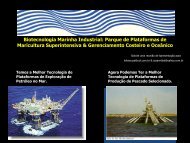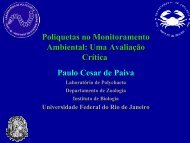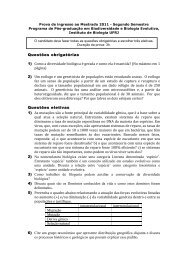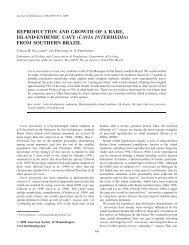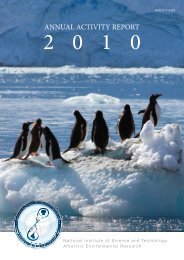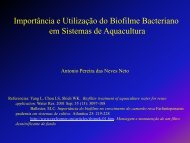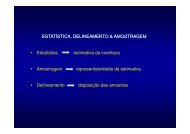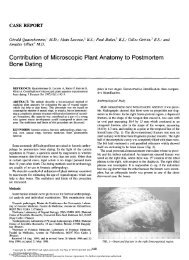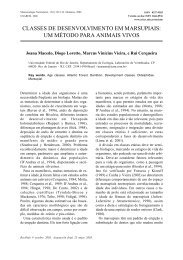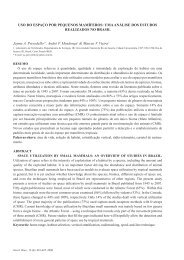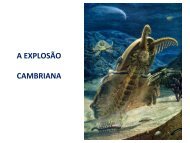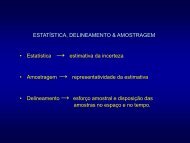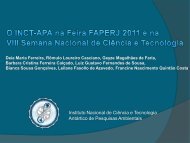1 - Instituto de Biologia da UFRJ
1 - Instituto de Biologia da UFRJ
1 - Instituto de Biologia da UFRJ
Create successful ePaper yourself
Turn your PDF publications into a flip-book with our unique Google optimized e-Paper software.
11<br />
Effect of diesel oil on gill enzymes of energy<br />
metabolism, antioxi<strong>da</strong>nt <strong>de</strong>fense and arginase<br />
of the gastropod Nacella concinna (Strebel 1908)<br />
from King George Island, Antarctica<br />
Feijó <strong>de</strong> Oliveira, M 1 .; Rodrigues Júnior, E 1 .; Gannabathula, S. V 2 .;<br />
Su<strong>da</strong>, C. N. K 2 .; Donatti, L 1 .; Lavrado, H. P 3 .; Rodrigues, E 2,*<br />
1<br />
Departamento <strong>de</strong> <strong>Biologia</strong> Celular, Universi<strong>da</strong><strong>de</strong> Fe<strong>de</strong>ral do Paraná – UFPR, Centro Politécnico, s/n,<br />
Jardim <strong>da</strong>s Américas, CEP 81990-970, Curitiba, PR, Brazil<br />
2<br />
<strong>Instituto</strong> Básico <strong>de</strong> Biociências, Universi<strong>da</strong><strong>de</strong> <strong>de</strong> Taubaté – UNITAU, Av. Tira<strong>de</strong>ntes, 500, Centro, CEP 12030-180, Taubaté, SP, Brazil<br />
3<br />
Departamento <strong>de</strong> <strong>Biologia</strong> Marinha, Universi<strong>da</strong><strong>de</strong> Fe<strong>de</strong>ral do Rio <strong>de</strong> Janeiro – <strong>UFRJ</strong>, Av. Carlos Chagas Filho, 373,<br />
Ilha do Fundão, CEP 21941-902, Rio <strong>de</strong> Janeiro, RJ, Brazil<br />
*e-mail: ro<strong>de</strong>dson@gmail.com<br />
Abstract: Raising human impact and pollution in Antarctica has focused studies to verify possible biomarker for environmental<br />
monitoring. Nacella concinna is the most conspicuous macro invertebrate of the Antarctic interti<strong>da</strong>l zone. The diesel oil leakage<br />
of icebreaker Bahia Paradise reduced in 50% N. concinna populations near Palmer Scientific Station. The aim of this study was<br />
to verify the effect of diesel oil on activity of enzymes hexokinase, lactate <strong>de</strong>hydrogenase, citrate synthase, malate <strong>de</strong>hydrogenase,<br />
glucose-6-phoshate <strong>de</strong>hydrogenase, glutathione reductase, catalase, superoxi<strong>de</strong> dismutase and arginase of Nacella concinna gills.<br />
Specimens collected in Keller Peninsula were maintained in mini aquariums containing 1% or 5% of diesel oil. The results showed<br />
that the enzymes arginase, phosphofructokinase and catalase are potential biomarkers for diesel oil pollution.<br />
Keywords: Antarctica, Nacella concinna, diesel oil, biomarkers<br />
Introduction<br />
The gastropod Nacella concinna is the most conspicuous<br />
macro invertebrate in the Antarctic seas, with an ample<br />
geographic distribution, and has been postulated as a sentinel<br />
organism due to its capacity for bioaccumulation of heavy<br />
metals (Ahn et al., 2002). The exposure to climate to the<br />
terrestrial environment when the ti<strong>de</strong> rece<strong>de</strong>s, freezing in<br />
winter, friction of the ice on sediments and rocks, reduction<br />
of salinity due to the entry of melt waters in to the sea and<br />
the exposure to ultraviolet radiation have been consi<strong>de</strong>red<br />
the principal stress factors on the organisms that inhabit the<br />
Antarctic interti<strong>da</strong>l zones (Davenport, 2001; Peck et al., 2006;<br />
Barnes & Peck, 2008; Obermüller et al., 2011).<br />
Human presence in the Antarctic has increased<br />
significantly during the last few <strong>de</strong>ca<strong>de</strong>s and has accelerated<br />
by international scientific efforts after the International<br />
Polar year 1957/58 (Tin et al., 2009). The concerns about<br />
the pollution around scientific stations and round the<br />
Anchorage locations of shipping vessels was justified after<br />
the sinking of the icebreaker Bahia Paradise in 1989, which<br />
resulted in the leakage of 600,000L of diesel oil in the Arthur<br />
Harbor, Antarctic Peninsula, close to the Palmer Scientific<br />
Station (USA) (Kennicutt II et al., 1992). In this case, the<br />
gastropod N. concinna population was reduced by 50%<br />
and only partially recovered after one year. Bioassays of<br />
N. concinna showed that diesel oil could elevate the protein<br />
oxi<strong>da</strong>tion and the levels of glutathione peroxi<strong>da</strong>se, in<br />
addition to reducing the levels of the catalase in the digestive<br />
148 | Annual Activity Report 2011



